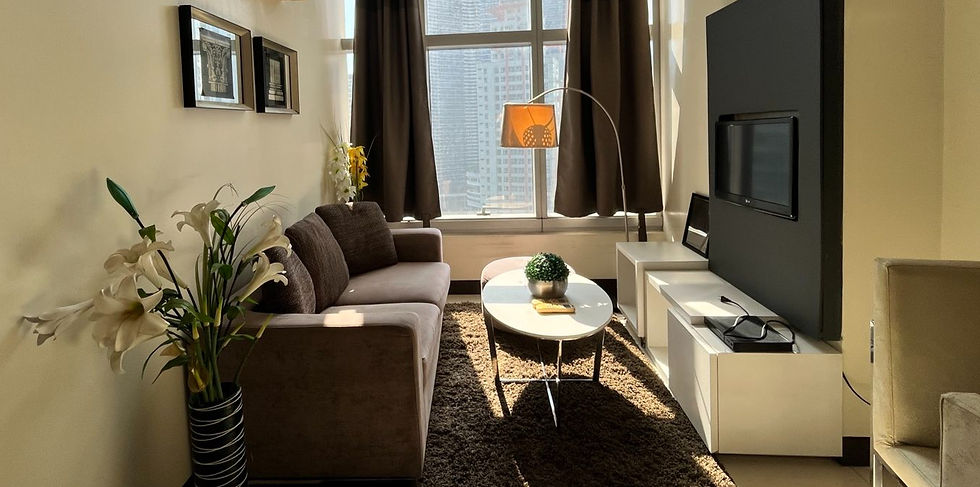3 Pros and Cons of Manila Rental Properties: What Every Local and Expat Should Know Before Moving In
- bedandgoinc
- 2024年11月4日
- 読了時間: 4分
Date: November 4, 2024

Renting a place in Manila, the bustling capital of the Philippines, offers a unique blend of city life, culture, and opportunity. With countless neighborhoods, modern amenities, and a thriving social scene, there's a lot to love about the city. But renting in Manila also comes with its own set of challenges. From navigating traffic to dealing with fluctuating rental costs, there's plenty to consider. In this article, we'll break down the three main pros and cons of renting a property in Manila, giving you a clear picture of what to expect. Whether you're a local or an expat exploring the city, this guide will help you make an informed decision about your next move.
3 Pros of Renting a Property in Manila
1. Affordability Compared to Other Major Cities
One of the standout benefits of renting in Manila is its affordability relative to other major cities in Asia, like Hong Kong or Singapore. Here, renters can find properties that fit various budgets, from affordable studio apartments in the city's outskirts to luxury condos in prime areas like Makati and Bonifacio Global City (BGC). For expatriates, this cost-effectiveness can be a major draw, allowing them to enjoy a high standard of living without breaking the bank. Additionally, the city's rental market offers a range of options for locals and expats alike, making it accessible to those on diverse incomes. This affordability also means that people can live in central areas without necessarily paying a premium.

2. Proximity to Essential Services and Entertainment
Living in Manila puts you close to essential services and entertainment options, making it convenient for those who thrive on an active lifestyle. With malls, hospitals, schools, and government offices within easy reach, residents don't have to go far for their daily needs. Popular neighborhoods like Makati, BGC, and Ortigas are packed with restaurants, shopping malls, bars, and entertainment hubs, giving tenants plenty to do right outside their doorsteps. For those who enjoy city life, renting in Manila means being in the heart of it all. This accessibility and convenience attract not only locals but also foreigners looking to experience a vibrant and diverse lifestyle.
3. Strong Expat Community and Networking Opportunities
Manila is home to a robust expat community, offering plenty of networking and socializing opportunities for foreign tenants. This sense of community is a massive perk, especially for newcomers who may feel a bit out of place in a foreign city. Various expat-friendly groups and organizations regularly host events, making it easy to meet people, learn about local customs, and feel more at home. For professionals, the city offers strong networking opportunities in fields like finance, IT, and digital marketing, given Manila's rapidly growing industries. With many multinational companies headquartered in the city, expats can find opportunities to connect with like-minded professionals, aiding both career and social life.

3 Cons of Renting a Property in Manila
1. Traffic Congestion and Long Commutes
Anyone who's been to Manila knows that traffic can be a nightmare. It's common for daily commutes to take hours, especially during peak times. For renters working in central areas, the constant traffic can be draining, impacting work-life balance and overall quality of life. While some neighborhoods like Makati and BGC have accessible public transport options and are walkable, others are less convenient, forcing residents to spend significant time on the road. This traffic problem often discourages people from venturing out, limiting their ability to explore the city and enjoy its various offerings. Many newcomers to the city underestimate this issue, but traffic is a factor that affects everyone, regardless of where they live.
2. Security and Safety Concerns
Safety can be a concern for renters in Manila, particularly in specific neighborhoods. Although some areas are well-patrolled and secure, other regions may be prone to petty crime, especially at night. Expats and locals alike need to do thorough research on neighborhoods before moving in, as certain parts of the city may pose higher risks. Fortunately, modern condos and apartments in central areas often come with security measures such as gated entrances, CCTV surveillance, and 24/7 guards, which can add a layer of protection. However, the added cost of security can be a downside, as it increases the overall rental price. For peace of mind, most renters are willing to pay for extra security, but it's still something worth considering.
3. Hidden Costs and Fluctuating Rental Prices
While Manila is known for its affordable rents, hidden costs and sudden price increases can surprise tenants. Many rentals come with additional fees for amenities, maintenance, or security services, which may not be clear upfront. Also, rental rates in popular areas can fluctuate significantly, especially during peak seasons or due to changes in the real estate market. This lack of price stability can make budgeting difficult, particularly for expats unfamiliar with local rental practices. Furthermore, some landlords may require a hefty deposit or upfront payment, which can be a financial strain for newcomers. These hidden costs and fluctuating prices can catch renters off guard, so it's essential to thoroughly review lease terms and clarify costs before signing.

Renting in Manila is a dynamic experience with plenty of ups and downs. On the one hand, the city offers affordable rentals, convenient access to essential services, and a strong expat community that can make the transition smoother. On the other hand, the notorious traffic, safety concerns, and hidden rental costs pose unique challenges that both locals and foreigners must consider. Whether you're a seasoned local or a newcomer, weighing these pros and cons carefully can help you make the best decision for your lifestyle and budget. Ultimately, Manila can be an incredible place to live if you go in with realistic expectations and a clear understanding of the rental landscape.









コメント